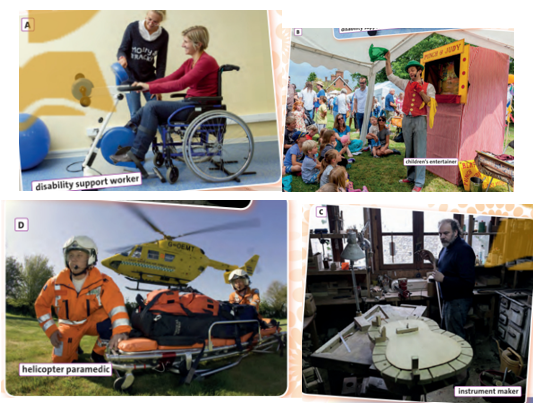8. Now do the speaking task above. Use your notes from exercise 7.
(Bây giờ hãy thực hiện nhiệm vụ nói ở trên. Sử dụng ghi chú của bạn từ bài tập 7.)
Manager: Welcome! It's great to have you here for the interview. How can I assist you today?
You: Thank you. I'm excited about the opportunity. I have a few questions to better understand the role.
Manager: Of course, feel free to ask anything.
You: Regarding the responsibilities of the sales assistant position, can you provide an overview of the specific tasks and duties expected?
Manager: Absolutely. As a sales assistant, you'll be responsible for handling customer inquiries, restocking shelves, and assisting with cashier duties during peak hours.
You: That sounds good. In terms of personal qualities, are there specific traits or characteristics you consider essential for a candidate in this role?
Manager: We value strong communication skills, a customer-focused approach, and the ability to work well in a team. Adaptability and a positive attitude are also crucial during the holiday rush.
You: Great. What about the experience required? Are there specific skills or previous roles that would make an applicant stand out?
Manager: While prior retail experience is beneficial, we also welcome candidates with a strong work ethic and a willingness to learn. Any experience in customer service is a plus.
You: In terms of hours of work, could you provide information on the typical working hours for this part-time holiday job? Are there flexible scheduling options?
Manager: We offer flexible scheduling to accommodate both our employees and the store's needs. Most shifts are during peak shopping hours, and we can discuss specific preferences during the onboarding process.
You: That's helpful. And regarding salary, could you discuss the salary structure for the part-time holiday position as a sales assistant?
Manager: Our pay is competitive, and we also have performance-based incentives. We can go into more detail during the job offer stage.
You: Lastly, about travel expenses, are there any support or reimbursement options for employees who may need to travel a considerable distance to reach the supermarket?
Manager: We don't provide direct travel expense reimbursement, but we encourage employees to explore carpooling or public transportation options. I hope that answers your questions. Do you have any more concerns or anything else you'd like to know?
You: No, that covers everything for now. Thank you for providing such detailed information.
Manager: You're welcome! We appreciate your interest in the position. We'll be in touch soon.
Tạm dịch
Quản lý: Xin chào! Thật tuyệt khi có bạn ở đây để phỏng vấn. Hôm nay tôi có thể giúp gì cho bạn?
Bạn: Cảm ơn bạn. Tôi rất vui mừng về cơ hội. Tôi có một số câu hỏi để hiểu rõ hơn về vai trò.
Quản lý: Tất nhiên, cứ thoải mái hỏi bất cứ điều gì.
Bạn: Về trách nhiệm của vị trí trợ lý bán hàng, bạn có thể cung cấp cái nhìn tổng quan về các công việc, nhiệm vụ cụ thể dự kiến được không?
Người quản lý: Chắc chắn rồi. Với tư cách là trợ lý bán hàng, bạn sẽ chịu trách nhiệm giải quyết các yêu cầu của khách hàng, bổ sung thêm hàng lên kệ và hỗ trợ các công việc thu ngân trong giờ cao điểm.
Bạn: Nghe có vẻ hay đấy. Về phẩm chất cá nhân, có những đặc điểm hoặc đặc điểm cụ thể nào mà bạn cho là cần thiết đối với ứng viên ở vai trò này không?
Người quản lý: Chúng tôi đánh giá cao kỹ năng giao tiếp tốt, cách tiếp cận tập trung vào khách hàng và khả năng làm việc nhóm tốt. Khả năng thích ứng và thái độ tích cực cũng rất quan trọng trong kỳ nghỉ lễ cao điểm.
Bạn thật tuyệt vời. Còn kinh nghiệm cần có thì sao? Có kỹ năng cụ thể hoặc vai trò nào trước đây có thể khiến ứng viên nổi bật không?
Người quản lý: Mặc dù kinh nghiệm bán lẻ trước đây là có lợi nhưng chúng tôi cũng chào đón những ứng viên có đạo đức làm việc tốt và sẵn sàng học hỏi. Bất kỳ kinh nghiệm trong dịch vụ khách hàng là một lợi thế.
Bạn: Về thời gian làm việc, bạn có thể cung cấp thông tin về giờ làm việc điển hình cho công việc bán thời gian trong kỳ nghỉ này không? Có các lựa chọn lịch linh hoạt không?
Người quản lý: Chúng tôi cung cấp lịch trình linh hoạt để đáp ứng nhu cầu của cả nhân viên và cửa hàng. Hầu hết các ca làm việc đều diễn ra trong giờ mua sắm cao điểm và chúng ta có thể thảo luận về các ưu tiên cụ thể trong quá trình giới thiệu.
Bạn: Điều đó thật hữu ích. Và về mức lương, bạn có thể thảo luận về cơ cấu lương cho vị trí trợ lý bán hàng trong kỳ nghỉ bán thời gian được không?
Người quản lý: Mức lương của chúng tôi rất cạnh tranh và chúng tôi cũng có các biện pháp khuyến khích dựa trên hiệu suất. Chúng ta có thể đi vào chi tiết hơn trong giai đoạn tuyển dụng.
Bạn: Cuối cùng, về chi phí đi lại, có phương án hỗ trợ hoặc hoàn trả nào cho những nhân viên có thể phải di chuyển một quãng đường đáng kể để đến siêu thị không?
Người quản lý: Chúng tôi không hoàn trả trực tiếp chi phí đi lại nhưng chúng tôi khuyến khích nhân viên khám phá các lựa chọn đi chung xe hoặc phương tiện giao thông công cộng. Tôi hy vọng đó là câu trả lời bạn muốn. Bạn còn mối lo ngại nào hay muốn biết điều gì nữa không?
Bạn: Không, điều đó bao gồm mọi thứ hiện tại. Cảm ơn bạn đã cung cấp thông tin chi tiết như vậy.
Người quản lý: Không có gì! Chúng tôi đánh giá cao sự quan tâm của bạn đối với vị trí này. Chúng tôi sẽ liên lạc sớm.

Các bài tập cùng chuyên đề
1 SPEAKING Describe the photos. In your opinion, which is a) the most interesting job and b) the most difficult job? Give reasons.
(Mô tả các bức ảnh. Theo bạn, đâu là a) công việc thú vị nhất và b) công việc khó khăn nhất? Đưa ra lý do.)

7 SPEAKING Work in pairs. Agree on which are the three most important or useful qualities when you are in the following situations. Use the adjectives and nouns from exercise 2, and the phrases from the Look out! box and exercise 6 to help you.
(Làm việc theo cặp. Đồng ý về ba phẩm chất quan trọng hoặc hữu ích nhất khi bạn ở trong các tình huống sau. Sử dụng các tính từ và danh từ trong bài tập 2, và các cụm từ trong Look out! hộp và bài tập 6 để giúp bạn.)
1 At a party
(Tại một bữa tiệc)
2 In a job interview
(Trong một cuộc phỏng vấn xin việc)
3 On a field trip
(Trong một chuyến dã ngoại)
4 In lessons
(Trong tiết học)
A: We think that sociability and ... are useful qualities to have when you're at a party.
B: It's best not to be... when you are...
(Chúng tôi nghĩ rằng tính xã hội và ... là những phẩm chất hữu ích cần có khi bạn dự tiệc.
B: Tốt nhất là đừng... khi bạn...)
6 SPEAKING Work in pairs. Ask and answer about your favourite high flyer. The following cues can help you.
(Làm việc theo cặp. Hỏi và trả lời về người bay cao yêu thích của bạn. Các gợi ý sau đây có thể giúp bạn.)
1 The high flyer you admire
(Người bay cao mà bạn ngưỡng mộ)
2 How you got to know about him/her
(Làm thế nào bạn biết về anh ấy / cô ấy)
3 The reason why you like him/her
(Lý do tại sao bạn thích anh ấy / cô ấy)
4 What you think decides his/her success
(Điều bạn nghĩ quyết định thành công của anh ấy/cô ấy)
1 SPEAKING Work in pairs. What qualities do you think you need to be a good journalist? Why? Discuss the qualities below and your own ideas.
(Làm việc theo cặp. Bạn nghĩ mình cần có những phẩm chất gì để trở thành một nhà báo giỏi? Tại sao? Thảo luận về những phẩm chất dưới đây và ý tưởng của riêng bạn.)

8 SPEAKING In what ways do you think Nellie Bly is a good role model? Give examples from her life to support your opinions. Use the phrases below and your own ideas.
(Theo cách nào bạn nghĩ Nellie Bly là một hình mẫu tốt? Đưa ra ví dụ từ cuộc sống của cô ấy để hỗ trợ ý kiến của bạn. Sử dụng các cụm từ dưới đây và ý tưởng của riêng bạn.)
discover the truth
(khám phá sự thật)
follow her dream
(theo đuổi giấc mơ của cô ấy)
help the poor
(giúp đỡ người nghèo)
make a difference
(tạo nên sự khác biệt)
win the race
(giành chiến thắng cuộc đua)
1 SPEAKING Read the passage. Would you like to take part in such a field trip?
(Đọc đoạn văn. Bạn có muốn tham gia vào một chuyến đi thực tế như vậy?)
Katie moved to Viet Nam after her mother found a job here. Having spent the first few months fitting to the new school, Katie now has an interesting school life. Last week, she joined her school’s field trip to Con Dao island. It involved releasing sea turtles into the sea. Having listened to careful instructions from the scientists, Katie and her friends received little turtles to care for before they took the turtles to the beach. Katie then learned how to release her little turtles to the sea. Though it was a short one, participating in the trip helped Katie make new friends. She loved having done something to protect the wildlife.
7 SPEAKING Work in pairs. Ask and answer the questions and follow-up questions from exercise 6.
(Làm việc theo cặp. Hỏi và trả lời các câu hỏi và câu hỏi tiếp theo từ bài tập 6.)
1 Look at the book cover. What do you think the book is about?
(Nhìn vào bìa sách. Bạn nghĩ cuốn sách nói về điều gì?)

6 SPEAKING Work in pairs. Discuss these questions and report your ideas to the class.
(Làm việc theo cặp. Thảo luận những câu hỏi này và báo cáo ý tưởng của bạn trước lớp.)
1 Do you think it is necessary for pesticides to be banned? Why?
(Theo bạn có cần cấm thuốc xịt cỏ không? Tại sao?)
2 Do you agree with the views Rachel Carson expressed in Silent Spring? Why?/Why not?
(Bạn có đồng ý với quan điểm mà Rachel Carson thể hiện trong Silent Spring không? Tại sao có / tại sao không?)
3 Would you like to be an ecologist? Why? / Why not? If so, what would you most concern yourself about?
(Bạn có muốn trở thành một nhà sinh thái học? Tại sao có? / Tại sao không? Nếu vậy, bạn sẽ quan tâm đến điều gì nhất?)
1 SPEAKING Why do people go abroad to work? Think of at least three reasons.
(Tại sao mọi người ra nước ngoài làm việc? Hãy nghĩ về ít nhất ba lý do.)
2 SPEAKING Compare and contrast the photos of people working abroad. What are the people doing?
(So sánh và đối chiếu những bức ảnh của những người làm việc ở nước ngoài. Mọi người đang làm gì?)

1 SPEAKING Work in pairs. Read the definition of vocational. Then think of three jobs for which you would need to do a vocational degree.
(Làm việc theo cặp. Đọc định nghĩa về ‘vocational’. Sau đó, nghĩ về ba công việc mà bạn sẽ cần phải có bằng cấp nghề)
vocational /vǝu'keifǝnl/ adj (of education or training) preparing students for a particular job: Vocational courses such as costume design and catering are becoming very popular.
(vocational /vǝu'keifǝnl/ adj (giáo dục hoặc đào tạo) chuẩn bị cho sinh viên một công việc cụ thể: Các khóa học nghề như thiết kế trang phục và phục vụ ăn uống đang trở nên rất phổ biến.)
2 Read the task and the essay. Do you agree with the writer's general opinion? Why? /Why not?
(Đọc nhiệm vụ và bài luận. Bạn có đồng ý với ý kiến chung của nhà văn? Tại sao tại sao không?)
Students should be encouraged to choose vocational courses at university instead of more traditional courses. Discuss.
(Học sinh nên được khuyến khích chọn các khóa học nghề tại trường đại học thay vì các khóa học truyền thống hơn. Bàn luận.)
Some people maintain that the benefits of vocational courses are greater than those of more traditional ones. That is the question we need to consider. It is certainly true that the workplace is becoming more competitive. A vocational course may be a more direct route into employment compared to traditional courses. It is also undeniable that certain jobs (for example nurse, hairdresser) are only available to people with a vocational qualification. On the other hand, choosing a vocational course means deciding what job you want to do when you are still at school. Many people believe this is too early. How can a teenager know what job is right for him or her? Another problem is that vocational courses only focus on what you need to learn for a particular job. Is it not better for students to explore other interests while at university? On balance, I do not believe that students should choose vocational courses unless they are sure what career they want to follow. It is wiser to opt for a course that really interests you.
Work in groups. Look at the photo and discuss the following point.
(Làm việc nhóm. Nhìn vào bức ảnh và thảo luận về điểm sau đây.)

'It's better to work alone because people in groups spend too much time talking.' Do you agree? Why? Why not?
(Làm việc một mình tốt hơn vì mọi người trong nhóm dành quá nhiều thời gian để nói chuyện.' Bạn có đồng ý không? Tại sao? Tại sao không?)
4. Match 1-5 with a-e to make the start of indirect questions.
(Nối 1-5 với a-e để bắt đầu câu hỏi gián tiếp.)

6. Listen again. Complete the indirect questions with phrases from exercise 4.
(Nghe lại. Hoàn thành các câu hỏi gián tiếp với các cụm từ trong bài tập 4.)
1 _____________if I could ask you some questions.
2 _____________what the job involves?
3 _____________what experience is required.
4 _____________what the salary is.
7. Read the task. Prepare questions about the information below. Think of follow-up questions to find out more details.
(Đọc nhiệm vụ. Chuẩn bị câu hỏi về thông tin dưới đây. Hãy nghĩ đến những câu hỏi tiếp theo để tìm hiểu thêm chi tiết.)
You have applied for a part-time holiday job as a sales assistant in a supermarket. You are going for an interview with the store manager. Prepare questions for the interview about these four points.
• responsibilities
• personal qualities and experience required
• hours of work and salary
• travel expenses.
(Bạn đã nộp đơn xin việc làm bán thời gian trong kỳ nghỉ với vị trí trợ lý bán hàng trong một siêu thị. Bạn sắp có một cuộc phỏng vấn với người quản lý cửa hàng. Chuẩn bị câu hỏi cho cuộc phỏng vấn về bốn điểm này.
• trách nhiệm
• yêu cầu về phẩm chất và kinh nghiệm cá nhân
• giờ làm việc và tiền lương
• chi phí đi lại.)
1 Responsibilities?
________________________________
2 Personal qualities?
________________________________
3 Experience required?
________________________________
4 Hours of work?
________________________________
5 Salary?
________________________________
6 Travel expenses?
________________________________







Danh sách bình luận